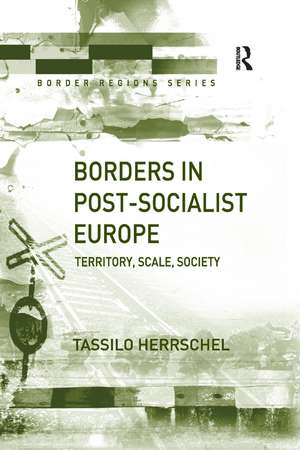Borders in Post-Socialist Europe: Territory, Scale, Society
Autor Tassilo Herrschelen Limba Engleză Paperback – 25 noi 2016
| Toate formatele și edițiile | Preț | Express |
|---|---|---|
| Paperback (1) | 469.34 lei 6-8 săpt. | |
| Taylor & Francis – 25 noi 2016 | 469.34 lei 6-8 săpt. | |
| Hardback (1) | 1055.84 lei 6-8 săpt. | |
| Taylor & Francis – 28 noi 2011 | 1055.84 lei 6-8 săpt. |
Preț: 469.34 lei
Nou
Puncte Express: 704
Preț estimativ în valută:
89.81€ • 97.86$ • 75.68£
89.81€ • 97.86$ • 75.68£
Carte tipărită la comandă
Livrare economică 23 aprilie-07 mai
Preluare comenzi: 021 569.72.76
Specificații
ISBN-13: 9781138266773
ISBN-10: 1138266779
Pagini: 216
Dimensiuni: 156 x 234 mm
Greutate: 0.45 kg
Ediția:1
Editura: Taylor & Francis
Colecția Routledge
Locul publicării:Oxford, United Kingdom
ISBN-10: 1138266779
Pagini: 216
Dimensiuni: 156 x 234 mm
Greutate: 0.45 kg
Ediția:1
Editura: Taylor & Francis
Colecția Routledge
Locul publicării:Oxford, United Kingdom
Notă biografică
Tassilo Herrschel is Reader (Associate Professor) in Urban and Regional Development in the Department of Politics and IR at the University of Westminster, UK. He is a board member of the Regional Studies Association, was Chair of the Post-Socialist Geographies Research Group of the RGS (with IBG), and served as a Member of the Commissioning Panel for the ESRC. He established, and continues to co-direct, the Centre for Urban and Regional Governance (CURG), and is a senior member of the Governance and Sustainability Programme at the University. Among his recent publications are Global Geographies of Post-socialist Transition (2007) and Cities between Globalisation and State (forthcoming)
Recenzii
'Europe - a phenomenon of a territory permanently shaped and reshaped by emerging and disappearing borders. Borders in Post-Socialist Europe offers an excellent account of changes of functions and meanings of borders, understood as a complex, multi-dimensional concept. For Eastern Europeans this book is not only an essential reference point but also offers some explanation of their life experience.' Iwona Sagan, University of Gdansk, Poland '... the book provides a lot of valuable information about the complex and multilevel character of borders and it can, possibly, be used as a textbook for young scholars with little background knowledge.' Slavic Review
Cuprins
Acknowledgments; Introduction; Chapter 1 Why Borders in Eastern Europe?; Chapter 2 Eastern Europe, ‘Transition’, and the Re-Making of Space, Spatiality and Borderness; Chapter 3 Multi-Level Bordering; Chapter 4 Virtual Territoriality and Multi-level Bordering in the ‘Virtual’ Baltic Sea Region; Chapter 5 Russia and Shifting Borders within and around the BSR; Chapter 6 Russia and Shifting Borders within and around the BSR; Chapter 7 Changing Borderness Towards a ‘Borderless’ Europe; Chapter 8 Conclusions – Towards Composite Multi-level Borderness in Europe;
Descriere
Using empirical case studies from post-socialist European countries, this book combines the main strands of the 'borders' debates in terms of their meanings at these different scales, and concerning their varying qualities and nature. By considering both fixed 'conventional' borders and imagined, cultural ones, and then investigating these at different spatial scales, the book considers whether there are links between scale and perceived immediacy and closeness, and thus the impact of borders on people's perception and action.












